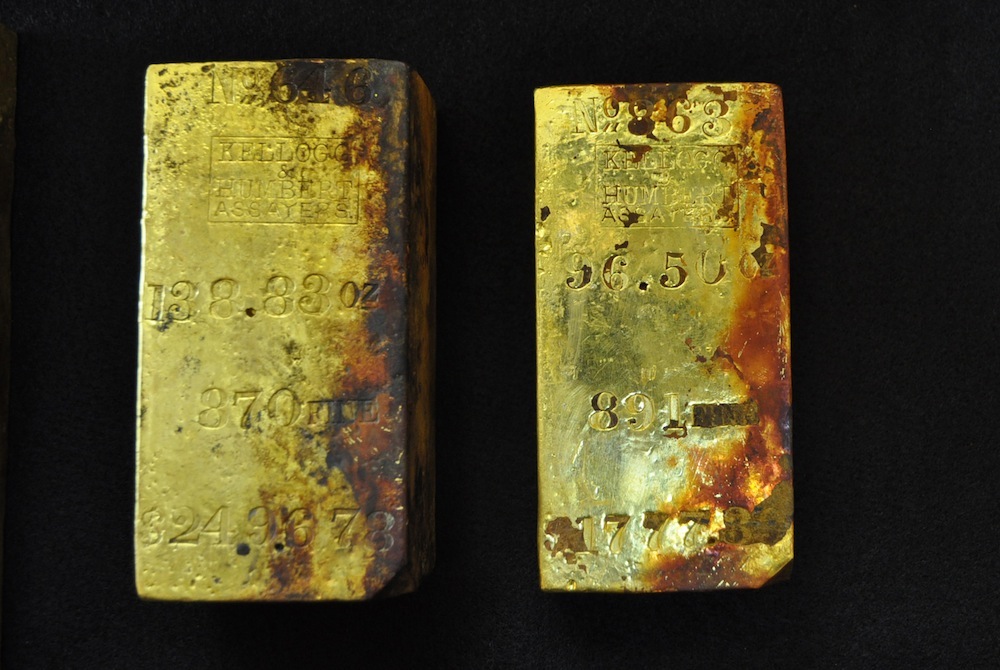Sunken 'Ship of Gold' Contains Bounty of Jewelry, Other Treasures

A trove of gold coins, bracelets, buckles and broaches are among the precious treasures retrieved from a 157-year-old shipwreck off the coast of South Carolina.
The "Ship of Gold," known in its sailing days as the SS Central America, was loaded down with 30,000 lbs. (13,600 kilograms) of gold when a hurricane sent it to the watery depths 160 miles (260 kilometers) from the coast of South Carolina on Sept. 12, 1857. In 1988, the shipwreck site was discovered, and recovery efforts pulled large amounts of gold from the bottom. But only about 5 percent of the site was excavated.
Now, deep-sea exploration company Odyssey Marine Exploration Inc., is re-excavating the site. Divers first pulled up five gold bars and two gold coins from the wreck in April 2014. Now, the recovery ship, the Odyssey Explorer, is benched for repairs, and archaeologists are quite literally counting the booty. [Gold Rush: Photos of a Real-Life Underwater Treasure Hunt]
Odyssey divers and archaeologists have now recovered more than 15,500 gold and silver coins and 45 gold bars from the wreck site, according to the company. They've also found gold jewelry, gold nuggets and snippets of 19th-century life, from glass containers to chewing tobacco still in its package.
Down with the ship
The SS Central America was a wooden-hulled, copper-plated steamship that traveled between New York and San Francisco during the heady days of the California Gold Rush. At the time the ship sank, it was carrying numerous gold ingots and freshly minted Double Eagle coins, which were worth $20 apiece at the time. So much gold was lost that public confidence in the banks — already overstretched at the time — was shattered, causing bank failures and a financial panic (The Panic of 1857) that resulted in a three-year economic depression.
Some of the 571 passengers and crew on board the SS Central America managed to evacuate to other ships during the storm, but 425 died.
Sign up for the Live Science daily newsletter now
Get the world’s most fascinating discoveries delivered straight to your inbox.
Odyssey has conducted a new high-resolution video survey of the wreck site, and is currently evaluating the data from the survey while the company's recovery ship, the Odyssey Explorer, is being repaired. The company gets 80 percent of the proceeds from the recovery of the "Ship of Gold's" treasure, pending the payment of a negotiated day rate and fee by Recovery Limited Partnership, the business financing the recovery. After these fees are set, Odyssey will receive 45 percent of the proceeds from the recovered treasure.
Sunken treasure
Among the artifacts retrieved from the shipwreck are glass stemware and perfume bottles, as well as a gold locket, a gold ring and a gilded bracelet, according to documents registering the finds with the court system.
Many of the finds harken back to the lives lost on the ship. Clay pipes, tobacco and even old photographic plates have been found resting in the debris field of the wreck. So have bits of jewelry, including earring hooks, badge pins, buckles and a set of gold-and-quartz cufflinks. In early August, divers found pieces of an old music box. Even the pits from long-rotted fruit have been recovered from the wreck.
Odyssey plans to resume excavations at the site within the next year.
Follow Stephanie Pappas on Twitter and Google+. Follow us @livescience, Facebook & Google+. Original article on Live Science.

Stephanie Pappas is a contributing writer for Live Science, covering topics ranging from geoscience to archaeology to the human brain and behavior. She was previously a senior writer for Live Science but is now a freelancer based in Denver, Colorado, and regularly contributes to Scientific American and The Monitor, the monthly magazine of the American Psychological Association. Stephanie received a bachelor's degree in psychology from the University of South Carolina and a graduate certificate in science communication from the University of California, Santa Cruz.









